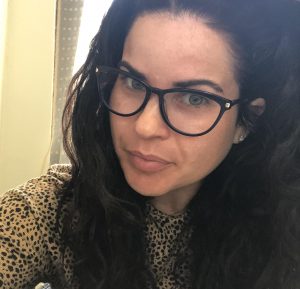Sarah McNamara named Mellon Emerging Faculty Leader

By Rachel Knight ‘18
Editor’s Note: The board of the Woodrow Wilson National Foundation unanimously voted to change its name. The interim name is the WW Foundation. For more information see, see the foundation’s FAQ page.
The WW National Fellowship Foundation selected 10 recipients of the Mellon Emerging Faculty Leader Awards (MEFL) for 2020. Among those selected is Sarah McNamara, assistant professor of history and core faculty in Latinx & Mexican American Studies in the College of Liberal Arts at Texas A&M University.
The award supports junior faculty whose research focuses on contemporary American history, politics, culture, and society. Those chosen for the award are committed to the creation of an inclusive campus community for underrepresented students and scholars. McNamara’s research examining the dissonance between federal immigration policy and grassroots activism across the twentieth century make her an exceptional choice for the award.
“The MEFL will support research on my second book project, Daring to DREAM: Latina Activisms and Immigration Policy in the U.S.,” McNamara explained. “The anchor of this study is the story of Latinas who intersected organizing spaces like the Highlander Center, the Democratic Party, and national immigrant rights organizations but later rejected the tactics and platforms of all. These women, instead, took on policy, politicians, and the for-profit deportation industry through independent, performative actions that achieved successes traditional forms of lobbying did not.”
McNamara pointed out that her upcoming book is intended for both academic and popular audiences, thus creating a more inclusive understanding of the topic. She also intends to take her research beyond the written word to make it more accessible to everyone.
“As I examine why and how some of the most audacious organizing for immigration reform has been led by Latinas, I envision amplifying their voices and experiences by producing a podcast that showcases the oral histories and events at the heart of this story,” McNamara said.
The MEFL award allows McNamara to spend more time on research by providing a 12-month stipend of $17,500 as she works toward tenure. The WW National Fellowship Foundation intends to free up this time so scholars can both engage in and build support for systems, networks, and affinity groups that make scholars’ fields and campuses more inclusive.
When Texas A&M Provost and Executive Vice President, Carol Fierke, heard McNamara had been named a 2020 MEFL recipient, she sent her congratulations to McNamara.
“I thank you for your commitment to supporting Texas A&M University in our goal of enhancing the campus community for underrepresented students and scholars,” Fierke said. “I look forward to hearing more about your research, teaching and service work.”
Right now, students are demanding a true commitment to a more inclusive Texas A&M, and people across the nation are demanding change to institutional power structures. McNamara’s research has the potential to contribute to both groups’ goals.
“Both my academic work and my commitment to students on campus seek to dismantle structural racism and compounding inequalities by asking us, as people who share space in a nation and a university community, to examine and recognize historical systems of oppression that control our present,” she explained. “If these structures could be created, they can also be dismantled by confronting our histories honestly and working to do better.”
The MEFL award is unique, because it recognizes both McNamara’s scholarship and her commitment to inclusivity through student mentorship, teaching, and professional services.
“I’m honored to receive the MEFL,” She said. “As a Latina scholar, one thing that drives me to do the work I do is a desire to expand academic understanding of latinidad while amplifying the voices of Latinx and marginalized communities. This award recognizes my professionally visible research and the portion of my work that is often unrecognized—my commitment to students and diversifying the profession.”
